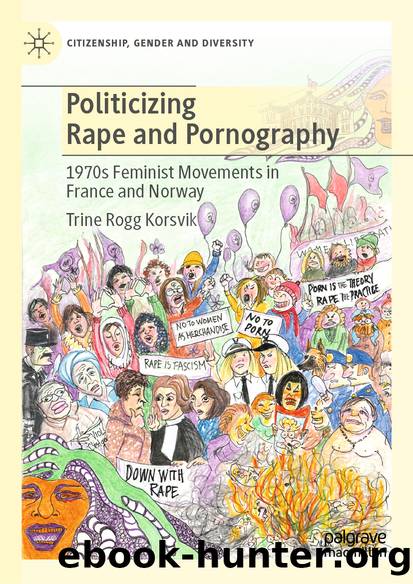Politicizing Rape and Pornography by Trine Rogg Korsvik

Author:Trine Rogg Korsvik
Language: eng
Format: epub
ISBN: 9783030556396
Publisher: Springer International Publishing
Theory Development
The politicization of sexual exploitation and violence against women led to the development of theories regarding these issues. For women activists associated with Marxist-Leninist parties, the issue caused them to direct their attention to oppression mechanisms other than purely economic ones. They became more independent of the political doctrines of the parties in the sense that, to a larger extent than previously, they challenged menâs views regarding women, including within the labor movement. The French class-struggle feminists showed bravery in challenging their male comrades and advocated the use of the âbourgeoisâ legal system in rape cases. Nevertheless, neither the French class-struggle feminists nor the Norwegian Womenâs Front publicly confronted men on the basis of sex, because they were deeply concerned about not creating divisions in the working class. For them, class conflicts were more important than gender conflicts, and it was important to recruit men in the fight for womenâs liberation .
Radical feminists were not reluctant to confront individual men, as they believed that these men were the beneficiaries of patriarchal exploitation. The French revolutionary feminists were more productive than the Norwegian New Feminists in the area of theory development. According to the French revolutionary feminists, rape was a âclass crimeâ that men as a class perpetrated against women as a class in order to keep them down. Rape was understood as the foundation of patriarchal exploitation, that is, menâs control over womenâs bodies and sexuality was viewed as the basis for all other structures of womenâs oppression, whether they be the nuclear family, religion, prostitution, the military, or the educational system. Thus, the fight against rape was fundamental. The French revolutionary feministsâ analysis of rape gained worldwide attention in connection with the International Tribunal on Crimes Against Women in Brussels in 1976, during which they dominated the session on rape. The tribunal was a breakthrough in the fight against violence against women and led to its becoming an important issue in the transnational womenâs movement. In the aftermath of the event, crisis centers for abused and raped women were established in several countries, including Norway, and a number of books and articles were written about rape and other forms of sexual violence. In addition, an international petition was circulated against clitoridectomy.167 The fact that women from so many countries met to discuss womenâs problems implied that they learned from each other, and that ideas and forms of action were being spread across borders. The analyses of violence against women were thus increasingly transnational.
The revolutionary feminist analyses of rape were radical, though Annie Cohenâs appeal for the arming of women to defend themselves against rape was still an exception. In addition to advocating that women act in solidarity with each other, the solutions were first and foremost proposed within the framework of the law. The most prominent strategy was that women who had been raped were encouraged to report to the police and pursue the case right up to the Assize Court. This was an approach that all of the different factions of the MLF eventually agreed upon.
Download
This site does not store any files on its server. We only index and link to content provided by other sites. Please contact the content providers to delete copyright contents if any and email us, we'll remove relevant links or contents immediately.
| Africa | Americas |
| Arctic & Antarctica | Asia |
| Australia & Oceania | Europe |
| Middle East | Russia |
| United States | World |
| Ancient Civilizations | Military |
| Historical Study & Educational Resources |
The Third Pole by Mark Synnott(947)
Money for Nothing by Thomas Levenson(938)
The Economist (20210109) by calibre(920)
Christian Ethics by Wilkens Steve;(854)
Made in China by Anna Qu(848)
The Age of Louis XIV: The Story of Civilization by Will Durant(816)
Nonstate Warfare by Stephen Biddle(808)
Reopening Muslim Minds by Mustafa Akyol(797)
100 Posters That Changed The World by Salter Colin T.;(781)
Culture by Terry Eagleton(769)
The Shortest History of China by Linda Jaivin(760)
The Great Pyramid Void Enigma by Scott Creighton(755)
The Irish Buddhist by Alicia Turner(751)
Ideology by Eagleton Terry;(729)
Routledge Handbook of Contemporary India by Knut A. Jacobsen(727)
Sybille Bedford by Selina Hastings(685)
The Jews of Silence: A Personal Report on Soviet Jewry by Elie Wiesel(674)
Banaras: CITY OF LIGHT by Diana L. Eck(664)
Objects of Vision by Saab A. Joan;(661)
